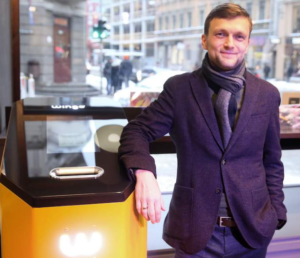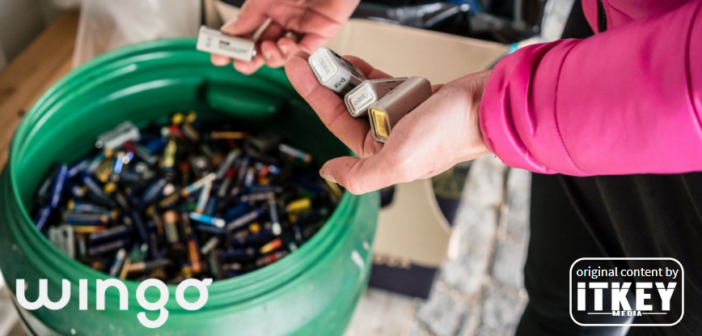- Latvia launches e-cigarette deposit system in 2026, led by startup Wingo Deposit
- The startup’s AI-powered machines reward users and accurately sort hazardous vape waste
- Wingo Deposit’s plans include exploring blockchain, expanding to more waste verticals, and international partnerships
This March, Latvian Minister of Climate and Energy Kaspars Melnis signed a memorandum with waste and health groups to launch a voluntary e-cigarette deposit system by January 1st, 2026. The initiative, led by the Riga-based startup Wingo Deposit, will use its unique proprietary device to collect hazardous vape waste and promote environmental health.
Tech-Driven Waste Management Innovation

Vismands Menjoks, Co-Founder and CEO at Wingo Deposit
Founded in 2020, Wingo Deposit is at the intersection of waste management and IT. Its co-founder Jurģis Ugors is one of Latvia’s leading experts in waste management with nearly a decade of experience in the field, while his partner Vismands Menjoks brings in-depth expertise in IT and computer vision solutions. The idea for Wingo emerged when Mr Ugors recognized a growing need for innovation in the waste sector, particularly in making extended producer responsibility systems more efficient, transparent, and user-friendly. With the combined understanding of industry needs and technological know-how, the founders realized they were uniquely positioned to create a smart deposit system tailored for the future of waste reduction and recycling.
The name Wingo was created by Jurģis Ugors together with Mārtiņš Millers, a London-based designer responsible for Wingo’s visual identity. The idea they put in this name is capturing the light and positive feeling of someone interacting with the Wingo machine – they deposit their waste, earn points or money in return, and then happily ‘wing off’ on their way. The name reflects the simplicity, reward, and user-friendliness at the heart of the Wingo experience.
AI-Powered Solution for Hazardous Waste
Wingo Deposit’s device tackles the growing issue of e-cigarette waste. The company brings prior expertise in deposit systems, having developed a waste-sorting machine that accepts, identifies, and sorts diverse packaging types. These include batteries, metal cans, cardboard backs, PET and glass bottles, showcasing Wingo Deposit’s innovative approach to sustainable waste management.
Wingo Deposit uses AI and computer vision technology to recognize waste items based on their shape, brand, and other visual features. For example, when a user inserts batteries, the system can identify the specific manufacturer. This allows for accurate tracking, sorting, and reporting within extended producer responsibility systems.
‘Wingo Deposit’s journey has been marked by bold steps and important milestones – from the initial idea to developing a fully functional prototype of the world’s first AI-powered deposit system for e-cigarettes. One of the biggest challenges has been navigating regulatory frameworks, especially when introducing a completely new type of deposit system that challenges the status quo. Changing legislation or pushing for updates often meets resistance, even when the solution is environmentally beneficial,’ Mr Menjoks tells ITKeyMedia.
Partners and Government Backing for Vape Recycling
Following the memorandum signed by Latvian Minister of Climate and Energy Kaspars Melnis, the Latvian Association of Waste Management Companies, and the Smoke-Free Latvia Association to launch a voluntary e-cigarette deposit system by next year, Wingo Deposit is working in close collaboration with these organizations. They will play a key role in the implementation of the system, including organizing and operating the disposal points across the country.

Kaspars Melnis, Minister of Climate and Energy of Latvia
‘To reduce environmental pollution and promote responsible behavior, the e-cigarette deposit system is a logical next step in building sustainable policies. The innovative solutions by Latvian entrepreneurs are not only the driving force of our economy but also proof that creativity and enterprise can create world-class solutions, which gives me great satisfaction,’ the Minister states.
The recycling of the collected e-cigarettes will be carried out by BAO, a company with extensive experience in hazardous waste management and Wingo Deposit’s shareholder. Its owner, Jānis Vilgerts, serves on Wingo’s advisory board and has been instrumental in guiding the team through the regulatory and technical complexities of hazardous waste disposal. His support has been crucial to aligning Wingo’s solution with the highest safety and compliance standards.
From Pilot to Proof
Wingo Deposit successfully piloted its system in Reitan Convenience Latvia stores, offering rewards like free coffee or shared transport minutes for returned e-cigarettes. The initiative proved effective, with up to 500 e-cigarettes collected in a single day, demonstrating strong public engagement and the system’s potential for large-scale impact.
The pilot phase revealed two clear user profiles. One group is primarily driven by the rewards—they’re motivated by the points or money equivalent that they receive for properly disposed waste. The other group isn’t concerned with the bonuses at all. For them, the key driver is the desire to protect the environment and reduce harm.
‘These insights will directly shape how we communicate and roll out the system. We’ll tailor messaging and features to appeal to both audiences—offering meaningful incentives for those who need them, and reinforcing the environmental impact for those who care most about doing the right thing,’ Mr Menjoks says.
Industry Support and Future Policy Outlook
The CEO shares that based on recent discussions with the responsible ministry, it now appears that the system may become mandatory in 2026. The authorities recognize the serious environmental and safety issues posed by improperly disposed e-cigarettes, and there is growing support for a structured solution.
‘This deposit system is a significant step in Latvia’s environmental protection efforts. We are not only reducing the impact of waste on the environment but also promoting the sustainable use of resources and active public participation. Together, we can create a cleaner and greener future where every citizen is responsible for their environmental impact,’ Minister Melnis adds.
At the same time, vape producers themselves have reportedly shown readiness to be part of the solution. They’ve proposed adding a €1 deposit to the retail price of each vape. If the vape is returned via a Wingo machine, the €1 is refunded. This model not only incentivizes responsible behavior but also ensures long-term engagement through a simple and effective financial mechanism.
‘By aligning environmental responsibility with user incentives and industry cooperation, we believe long-term adoption can be both sustainable and impactful. We focus on making proper disposal easy, rewarding, and visible. By combining education with accessible technology, we aim to shift public perception—showing that disposing of e-cigarettes responsibly isn’t just the right thing to do, it’s also simple and beneficial. Our goal is simple but urgent: to prevent hazardous waste like e-cigarettes from ending up in places where they don’t belong,’ Mr Menjoks comments.

Jurģis Ugors, Co-Founder at Wingo Deposit
According to Mr Ugors, the waste management sector is only now beginning its technological breakthrough. ‘This shift is largely driven by a generational change and growing demand for modern, user-centric solutions that actively engage consumers and empower them to take better care of the environment. Until recently, the industry lacked the necessary pressure and mindset to adopt smart, digital tools–but today, innovation is no longer optional, it’s expected,’ he points out.
Opportunities: Blockchain, Scalability, and International Ambition
Wingo Deposit is exploring additional digital tracking solutions, including blockchain technology, to enhance transparency and traceability throughout the recycling process. Such tools could significantly increase accountability and build trust across the entire chain, from producers to consumers and regulators. Accurate CO₂ accounting can be linked to the collected waste and the potential of creating tradable environmental impact units in the future. Such innovations have the potential to take Wingo deposit to the next level in terms of environmental responsibility and data integrity. Naturally, implementing such tools would require partners who specialize in these technologies.
The Wingo Deposit system has an obvious potential to cover additional waste streams in the future. One of the system’s biggest strengths is its ability to track and quantify waste flows with high precision, which makes it ideal for managing not only e-cigarettes but other types of hazardous or hard-to-recycle waste. In this context, Mr Menjoks shares a small teaser—the startup is currently in discussions with one very well-known cosmetics brand about placing Wingo machines in their stores in Germany to collect used lipstick products directly from consumers. This demonstrates the system’s adaptability and growing international interest in producer-driven, tech-enabled circular solutions.
International expansion is another key part of Wingo Deposit’s strategy. The team is currently in active discussions with partners in the UK, Estonia, Lithuania, and Germany. In Estonia, the company built a strong collaboration with the Beamline accelerator, which supports regional growth efforts. Growing interest from Greece and the USA also promises exciting opportunities to bring Wingo Deposit’s solution to markets facing similar waste management challenges.
Mr Menjoks firmly believes that the adaptability of the Wingo system allows it to fit a wide range of regulatory and cultural contexts and is confident it can make a meaningful impact on a global scale.

Kostiantyn is a freelance writer from Crimea but based in Lviv. He loves writing about IT and high tech because those topics are always upbeat and he’s an inherent optimist!




